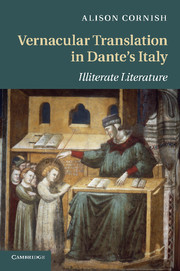
- Publisher:
- Cambridge University Press
- Online publication date:
- February 2011
- Print publication year:
- 2010
- Online ISBN:
- 9780511734762

Translation and commentary are often associated with institutions and patronage; but in Italy around the time of Dante, widespread vernacular translation was mostly on the spontaneous initiative of individuals. While Dante is usually the starting point for histories of vernacular translation in Europe, this book demonstrates that The Divine Comedy places itself in opposition to a vast vernacular literature already in circulation among its readers. Alison Cornish explores the anxiety of vernacularization as expressed by translators and contemporary authors, the prevalence of translation in religious experience, the role of scribal mediation, the influence of the Italian reception of French literature on that literature, and how translating into the vernacular became a project of nation-building only after its virtual demise during the Humanist period. Vernacular translation was a phenomenon with which all authors in thirteenth- and fourteenth-century Europe - from Brunetto Latini to Giovanni Boccaccio - had to contend.
"Overall the volume is a thought provoking invitation to look anew at the wholephenomenon and will doubtless become a touchstone in debates over the origins oftranslation practice at a time when translation studies is becoming an increasinglyvocal research field in its own right."
-STEPHEN J. MILNER,The University of Manchester
"Alison Cornish writes a detailed and brilliant study of the dual osmosis through the diaphragms of languages between France and Italy..."
-Modern Language Review
"This innovative work of scholarship will be very useful for specialists inDante and Italian Studies as well as non-specialists in the fields of English,Comparative Literature and Translation Studies. It breaks new ground in that itis the first book-length treatment of the general phenomenon of volgarizzamentiin Italy—that is, the traditions of translation or “vernacularization” of Latinand French works into the Italian vernacular(s) between the thirteenth andfifteenth centuries in Italy.... The book is impressive both for its boldness and its humility. Only an intrepid scholar would undertake to address in a comprehensive manner such a complex phenomenon..."
--Comptes Rendus
"This book will be obligatory reading for anyone interested in the contours of vernacularity in fourteenth century Italy, an exciting and stimulating exploration of its riches and manifest aspects."
--Miglior Acque
 Loading metrics...
Loading metrics...
* Views captured on Cambridge Core between #date#. This data will be updated every 24 hours.
Usage data cannot currently be displayed.
Accessibility compliance for the PDF of this book is currently unknown and may be updated in the future.